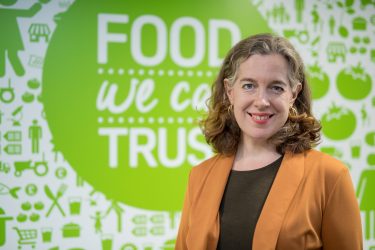FSA Chief issues rallying call to food industry to change
- Like
- Digg
- Del
- Tumblr
- VKontakte
- Buffer
- Love This
- Odnoklassniki
- Meneame
- Blogger
- Amazon
- Yahoo Mail
- Gmail
- AOL
- Newsvine
- HackerNews
- Evernote
- MySpace
- Mail.ru
- Viadeo
- Line
- Comments
- Yummly
- SMS
- Viber
- Telegram
- Subscribe
- Skype
- Facebook Messenger
- Kakao
- LiveJournal
- Yammer
- Edgar
- Fintel
- Mix
- Instapaper
- Copy Link
Posted: 7 December 2020 | Joshua Minchin (New Food) | No comments yet
In a recent speech, FSA Chief Executive Emily Miles paid tribute to the food industry for coping with demand during the early stages of the COVID-19 pandemic, but stressed that now is the time for change.


FSA Chief Emily Miles has questioned dhow much power consumers actually wield.
The Food Standards Agency’s (FSA) Chief Executive, Emily Miles, has called for change. As well as urging the food sector to promote a more sustainable future, she has said the industry must encourage healthier lifestyles across the UK.
Speaking at the Westminster Food & Nutrition Forum policy conference, she criticised a lack of joined-up thinking when it came to implementing policies to further health and sustainability, and said a more united approach is required to drive change.
Of course, the COVID-19 pandemic has put plenty of strain on the food industry, and Miles began by paying tribute to the system for coping with such demand.
“April, May and June brought into sharp focus a food system that is good at delivering cheap food, consumer choice and immediate availability. It was those strengths that we scrambled to protect and the public demanded we maintain,” she said.
“But now, as news of vaccines bring some hope, I think it is time to refocus on how we can achieve a food system that maintains the robustness and resilience of the current system, but also delivers on a vision for a healthier and more sustainable supply of food.”
How much power do consumers have?
There is plenty of debate over the influence consumers have in terms of forcing big companies to make more sustainable decisions.
“Consumer choice affects business behaviour. You can see that from the way retailers in the last two years have been working to take out plastic from their supply chains, and the pressure they feel over the use of child labour,” Miles said.


Emily Miles
“Consumer power is also the driving force behind our own Food Hygiene Rating Scheme.” She explained that the FHRS allows the public to vote with their feet, adding that evidence has suggested it pushes businesses to “raise their game”.
She expanded: “In 2013, 53 percent of food businesses achieved the top rating of five, this had increased to 73 percent by 2020.”
As Miles admitted though, there is only so much power consumers wield – ultimately, they can only make choices from the options presented to them. “Leaving it entirely up to consumers’ individual transactional choices to push industry into providing healthier and more environmentally sustainable produce is putting too much burden on consumers.”
She highlighted the fact that one-third of spend on food is Out-of-Home so does not have food labels, and added that FSA research has discovered that consumers find food labels confusing and tend to only look at them when they have a specific dietary requirement or to check use-by dates.
In addition to this, she claimed that consumers felt that there is limited information available on labels for environmental questions. Other than the ‘organics’ indicator (which according to Miles many don’t understand, with only about 10 percent of people actively choosing to eat organically), there are few other uniform ways of informing choice. “Consumer choice only gets you so far as a policy mechanism. Consumers pay taxes so that these difficult issues, some beyond their individual influence, are dealt with in their interests.
“We need the industry to work with Government to make it easier for consumers to choose food that does them and the planet good.”
A joined-up approach
According to Miles, one of the biggest barriers to sustainable progress is the splintered way that the food industry is currently regulated: “It is essential to think in a joined-up way about how to incentivise, not just instruct, food businesses to do the right thing.
“But we must do this across systems, rather than product-by-product, establishment by establishment. One of the central aspects of the FSA’s regulatory reform programme is exactly this – looking to treat the big industry actors as one entity, rather than many establishments.”
She continued: “You may understandably question who in Government is responsible for ensuring the food system provides healthy and sustainable food. The responsibility for food policy – labelling, safety, nutrition, sustainability – is spread across multiple Government departments and agencies, across all four countries.
“There needs to be structural change in the system. It’s clear that the arrangements over the last decade have not worked. Nearly two-thirds of us are overweight or obese. In terms of sustainability, the UK ranks only eighth out of 10 European countries in the Global Food Sustainability Index. On ‘sustainable agriculture’ impacts, the UK ranks 20th out of 34 countries. We need to do better.”
A vision for the future
The FSA Chief Executive finished her speech by outlining what she sees as the future for the food industry in the UK, while also imploring stakeholders to come together to realise a more sustainable future: “My vision for how the food system works in the future is one where Government uses its powers and knowledge on behalf of the people of the UK, so that they can trust that their food does good.”
It should make it easy for people to choose food that is good for them and for the environment, and make it easy for businesses to do the same, she added. “It’s one where businesses can make a profit in keeping with the country’s values; taking care of us and the environment.
“Everything we know about making a difference tells us that when we pull together, across Governments, private sector and people, we can move mountains. The whole country’s response to the first wave of COVID-19 showed us that. We owe it to ourselves, our families, and the planet, to have food that does good.”
Related topics
COVID-19, Environment, Health & Nutrition, Labelling, Obesity, Packaging & Labelling, Recruitment & workforce, Regulation & Legislation, retail, Supermarket, Supply chain, Sustainability, The consumer, Trade & Economy







